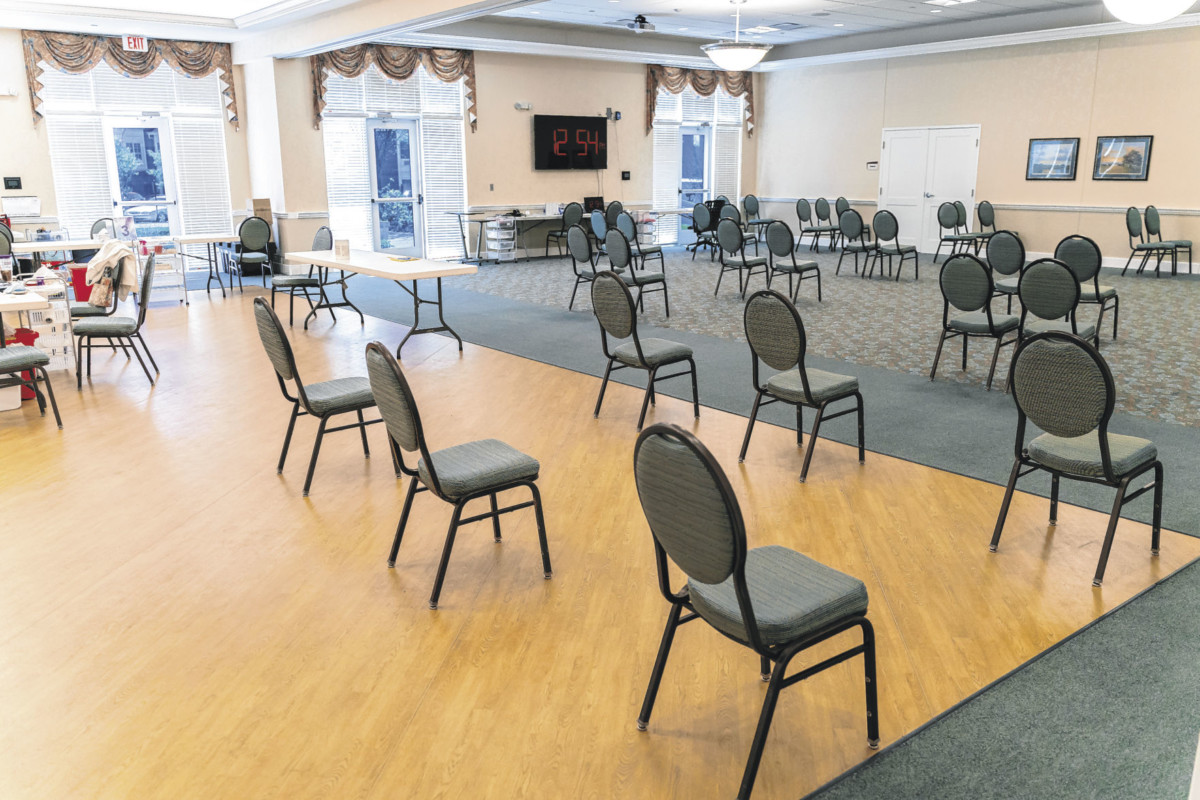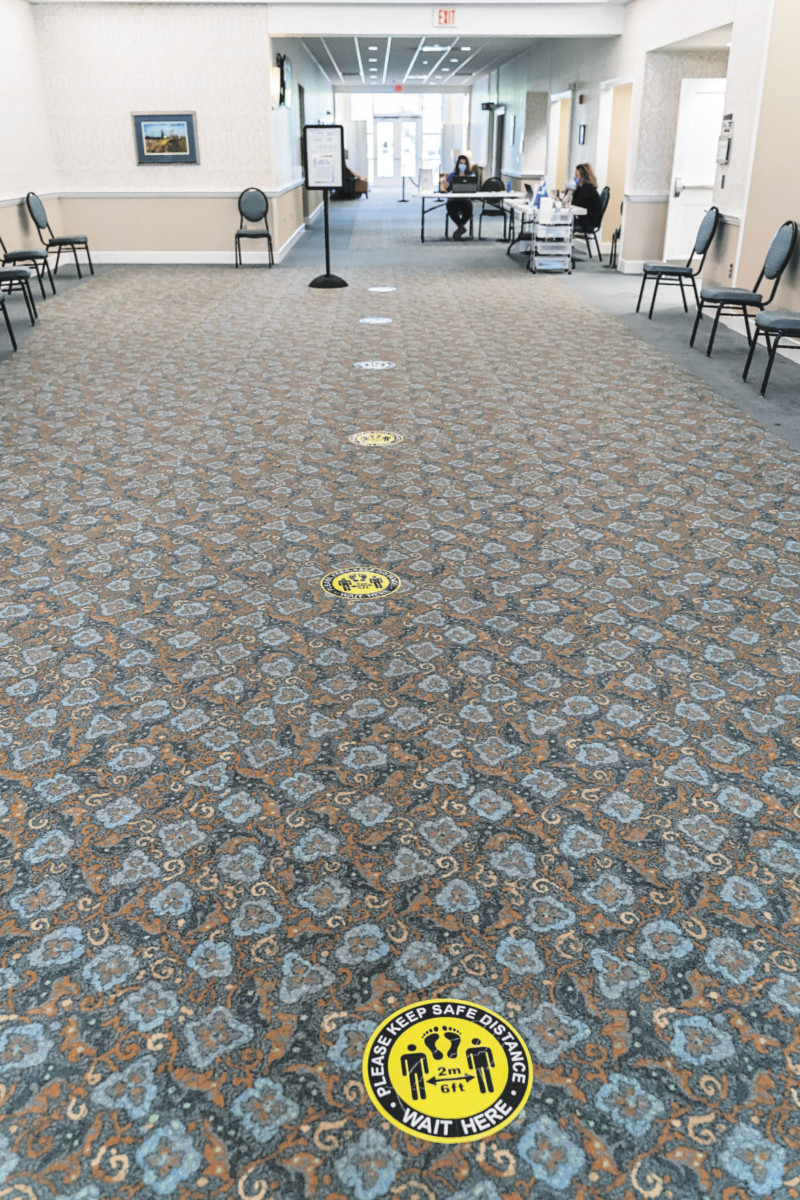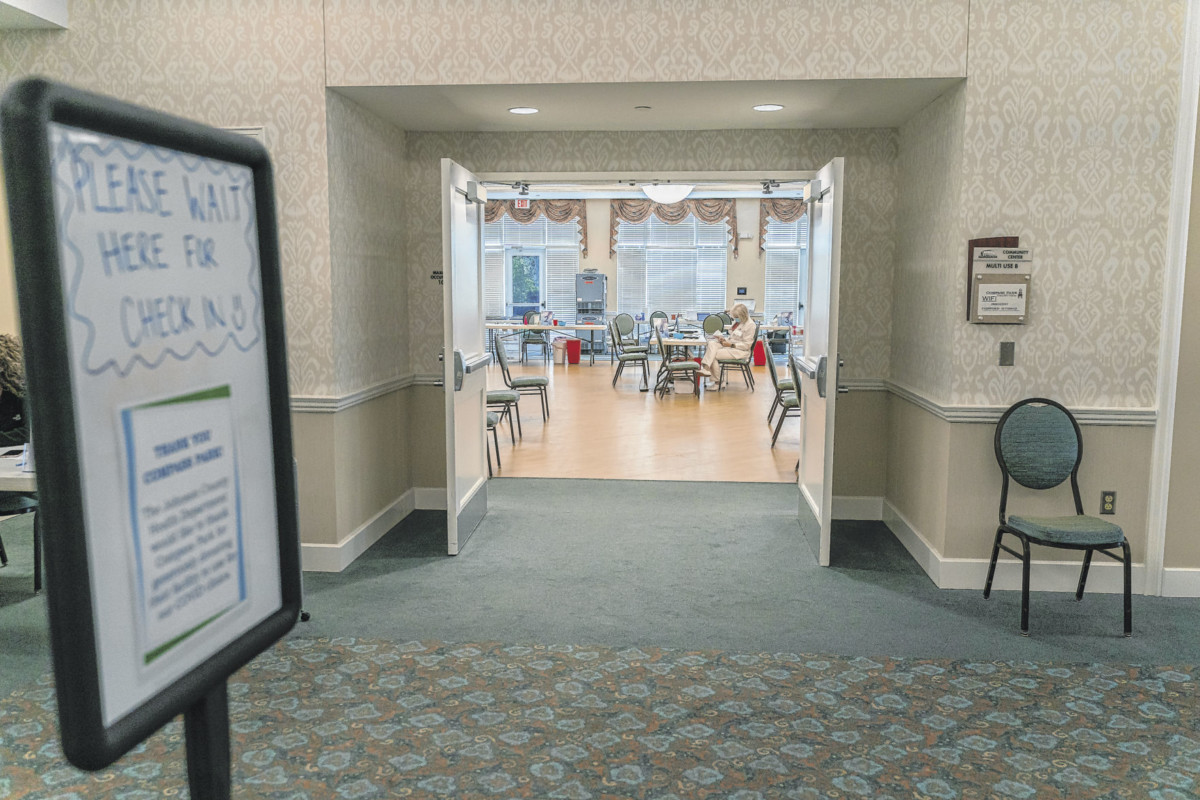
The Compass Park vaccine clinic was a ghost town at noon on Monday. The sole appointment for that time slot was a no-show.
Scenes like that are becoming more common locally and nationally. Demand at the Johnson County Health Department’s clinic at Franklin’s Compass Park has steadily decreased in recent weeks, said Betsy Swearingen, health department director.
“Each week it is more steadily declining,” Swearingen said. “I think we have vaccinated all of the ones who were excited and looking forward to the vaccine.”
Clinic turns down vaccines
The health department vaccinated 188 people last week, compared to 100 a day when the clinic first opened, she said.
The low numbers are due, in part, to vaccine shopping, or people who make multiple appointments but fail to cancel the appointments they don’t need, Swearingen said. During the second week the clinic was open, there were 100 no-shows in a single day. They either decided they didn’t want the vaccine or found a shot elsewhere, she said.
With so few showing up for their appointments, the health department turned down a new shipment of vaccines this week because there were already more than enough on hand, Swearingen said.
As a result, the health department is now accepting walk-in appointments each day until 3 p.m. Those who prefer an appointment can make one on the state’s website at ourshot.in.gov or by calling 211.
No-shows are also a problem at Johnson Memorial Hospital and Franciscan Health Indianapolis, but not to the same extent. Similarly, neither site is seeing a decline in demand to the extent of Compass Park.
Typically, about 5% of appointments are no-shows each day at Johnson Memorial Hospital, said Dr. David Dunkle, hospital president and CEO.
At Franciscan, between 8% and 15% are no-shows each day, said Misty Tidd, a nurse who manages the vaccine clinic for the hospital.
It has prompted staff to draw up fewer vaccines, which relieves the stress of finding extra people to take remaining doses at the end of the day, she said.
Vaccine shopping is also the No. 1 reason for no-shows at Franciscan. Tidd has taken to calling people who don’t show up to see if they still need or want a vaccine. Typically individuals are apologetic and say they forgot to cancel, or they thought the 211 call center would cancel it for them after they received a shot elsewhere, Tidd said.

Vaccine pause caused fear, hesitancy
Hesitancy doesn’t seem to be a big factor for cancellations at Franciscan, Tidd said. Many young people are signing up for the vaccine on the southside, including teens.
But Swearingen fears hesitancy might be a reason for some of the Compass Park cancellations, as they have increased since reports of severe blood clots put the Johnson and Johnson vaccine on hold temporarily, she said.
“I think people are scared of side effects and that has convinced the people who were on the fence not to do it,” Swearingen said.
The Johnson and Johnson vaccine was made available again this weekend. The Centers for Disease Control and Prevention has taken the vaccine off pause with a warning that there is a risk of rare but severe blood clots in women 50 and younger. The Indiana Department of Health began offering the vaccines again at Indianapolis Motor Speedway, where a month-long mass vaccination clinic has been underway.
Vaccinations have also slowed on a national scale, partly due to the Johnson and Johnson pause and a wane in interest for vaccines in many states, even as eligibility has expanded to include everyone 16 and older.
As the vaccination program progresses, the Biden administration believes it will only get more difficult to sustain the current pace of about 3 million shots per day.
Roughly 130 million Americans have yet to receive a dose, and just 32% of Indiana residents are vaccinated, according to national and state data.
Last week, President Joe Biden acknowledged the United States is entering a “new phase” in its federal vaccination effort that relies on increased outreach to Americans to get their shots, to protect both them and their communities.
“Vaccines can save your own life, but they can also save your grandmother’s life, your co-worker’s life, the grocery store clerk or the delivery person helping you and your neighbors get through the crisis,” Biden said. “That’s why you should get vaccinated.”
Misinformation partly to blame
Several readers who responded to a request for feedback reported they are hesitant to get vaccinated due to the potential side effects, both long and short term.
Some say they want to wait to see how others respond to the vaccine before getting it themselves. One reader stressed that long-term side effects are still a big unknown.
Dunkle is concerned people are not getting vaccinated due to misinformation, or because they don’t think there is a risk of a serious outcome if they become infected, he said.
One popular myth is that the vaccine causes infertility, or it is dangerous to pregnant women, Dunkle said. With millions of women vaccinated, there is no evidence to support either of the internet rumors, he said.
And though the vaccine is new, there is no reason to believe long-term side effects would be an issue, Dunkle said.
The vaccines are designed to prompt an immune response by showing the body how to respond to the virus and are physically incapable of changing DNA.
Combating downturn in demand
For anyone who is on the fence, Dunkle points to the situation at Johnson Memorial as proof there is still a need to be vaccinated.
In the past few weeks, the hospital has had two or three COVID-19 patients a day. Unlike earlier in the pandemic, there is now a mix of old and young individuals hospitalized due to variants of the virus that are more easily transmitted and more adverse to the body’s immune response, he said.
The youngest COVID-19 patients at the Franklin hospital right now is just 24 years old; the oldest is 76. With such a wide range of patients, Dunkle urges people of all ages to get fully vaccinated as soon as possible.
People should also continue to wear facemasks to reduce the spread of the virus, as herd immunity is still a long way away, he said. Locally, 32.6% of residents are fully vaccinated.
Local health experts warn that if not enough people are vaccinated, variants of the virus could mutate to the point that the vaccines that are already in arms become ineffective, essentially putting the world back to square one.
Even those who have had COVID-19 can benefit from the added protection the vaccine provides. It is important to remember that COVID-19 was the No. 3 killer in 2020, and people are still dying everyday, Dunkle said.
“We can’t turn a blind eye,” he said. “We have to do what is best for society. What is best for society is to reach herd immunity.”
For anyone who is still on the fence, Tidd says they should ask their doctor about the vaccine or look over the information that the CDC has gathered about the it.
The downturn in demand comes at a time when vaccinations should be surging, Swearingen said.
With masks now optional in many states, including Indiana, and an appetite for travel returning, there is more risk to the unvaccinated than ever, she said.
To combat the downturn in demand, the local health department is reaching out to local groups and posting fliers about the Compass Park clinic at local businesses. The fliers are aimed at letting residents know the vaccine is easily accessible, Swearingen said.
At the national level, the Biden administration is encouraging employers to give employees time off to be vaccinated and deal with side effects of the vaccine. For small businesses, he announced a tax credit to provide paid leave to those getting vaccinated or needing time off to recover from potential side effects.
The incentives are paid for by way of the $1.9 trillion relief package passed last month, and would provide a credit of up to $511 per day, per employee for businesses with fewer than 500 workers, to ensure that those workers or businesses don’t suffer a penalty for getting vaccinated.
The Associated Press contributed to this report.





